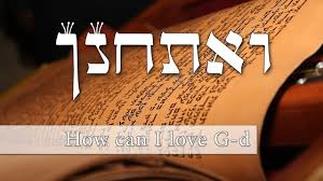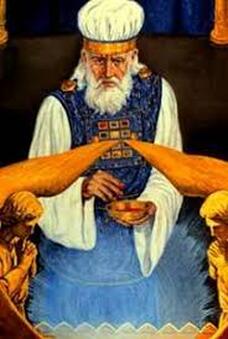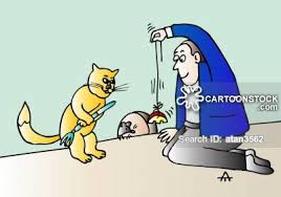
... and you are to love Adonai your God with all your heart, all your being and all your resources. (Deu 6:5 CJB)
Our Torah to the World: An Exemplary Behavior.
LOVE
Everybody likes to receive love, and some of us even apply ourselves to be loving persons. Playing on a famous saying, we may need to remember that love is a multi-faceted diamond, and some things that some people call "love" may make us feel like, "With this kind of love, who needs hatred!"
Here are some questions to ask ourselves.
Can love be defined by certain parameters of conduct? If the answer to this question is "no,", the next question is, “Is love a free-for-all expression?” But if the answer to the first question is "yes," the next question should then be, “What are these parameters of conduct that define love?”
HOW TO LOVE HASHEM
Does HaShem need our "gooey-shmooey-marshmallow-sugar-and-whipped-cream" emotional type of love?
Does He need to be constantly reminded about it like an unsecured lover, or as if He had memory loss issues?
Does He even need to see spiritual manifestations of our faith in Him in order for Him to know it?
Let’s take a look at what the sages have gleaned from Deuteronomy 6:5.
And you are to love Adonai your God with all your heart, all your being and all your resources.
(Deu 6:5)
Some of the sages of Israel teach the words in Deut 6:5 as an injunction to behave in a manner that causes the Name of Heaven to be beloved.
Here is what they say. "One should study Torah, serve Torah scholars, be honest in his business dealings, and speak pleasantly to others. Then people will say about him, 'Fortunate is his father who taught him Torah. Fortunate is his teacher who taught him Torah. Woe to those who have not learned Torah. See how pleasant are the ways and how pleasant are the actions of one who has learned Torah.'
If however, someone studies Torah and serves Torah scholars, but is not honest in his business dealings and does not speak pleasantly to others, what do people say about him? "Woe to that person who learned Torah. Woe to his father who taught him Torah. Woe to his teacher who taught him Torah. See how corrupt are the actions and how ugly are the ways of this person who learned Torah." (Yomah 86a)
As we read this passage, I think that we should notice what the author considered our 'witness' to the world.
- To be honest in business
- To speak pleasantly to others.
We all have our own ideas of how to express our love and obedience to HaShem, as well as to how to make it manifest to others. To accomplish these, most of us usually naturally rely on outward external signs of obedience such as open public displays of tzitzits, head coverings, a certain type of clothing, diet restrictions, holiday schedules, and even an 'hebraicised' lingo. I noticed that the less one is secure in his Messianic Jewish identity, the more outward signs he feels he has to produce. It is a natural human attitude with religion, politics, or philosophy. The less it is in the heart, the more we feel the need to use outward expressions.
Having been raised in Sephardic Conservative Judaism, I know that in the Jewish community, while not denying and even while being proud of who we are, we often try to keep a more discreet profile. This attitude comes from our history which tells us that being Jewish is like having a target on our chest.
In general, people do not really care about what we eat or don't eat; about how, why, and when we take a day of rest, and neither about how we dress. All religions and philosophies express themselves through particular diets, schedules, and clothing preferences. For secular folks, one is as good as the other, so, we should ask ourselves, “Are these today the things that are important when it comes to our witness HaShem’s greatness to the world?” The talmudic passage from Yomah that we previously read gives us other ideas to consider as our witness of HaShem’s greatness to the world. Among other things, it tells us that in order to show exemplary behavior one should, "be honest in his business dealings, and speak pleasantly to others."
I'd like to bring to light another passage that tells us how unbelievers should react to our Torah “performance.”
Therefore, observe them [the commandments]; and follow them; for then all peoples will see you as having wisdom and understanding. When they hear of all these laws, they will say, 'This great nation is surely a wise and understanding people.' For what great nation is there that has God as close to them as Adonai our God is, whenever we call on him? What great nation is there that has laws and rulings as just as this entire Torah which I am setting before you today? (Deu 4:6-8 CJB)
...If instead of this, our Torah “performance” comes out as abrasive, argumentative, arrogant, harsh, inconsiderate, and provokes division, awkwardness, hatred, and anger; or if it rationalizes dishonesty, selfishness, cheating, or murder, maybe we should consider re-visiting the script of that performance.
Some may then wonder, “What about Jeremiah, Elijah, Pinchas (of whom we talked about in a previous midrash); and what about Yeshua who sometimes acted in ways that could be considered harsh, divisive, and combative ?”. The difference is that Yeshua and the prophets had their mandates from HaShem; we have ours, and it is not the same. Theirs is not our mandate. Our mandate concerning the fruits of our witness in the world has been given to us by Moshe in Deut 4:6-8 as well as by our Rabbi and Master Yeshua in,
"You are light for the world. A town built on a hill cannot be hidden. Likewise, when people light a lamp, they don't cover it with a bowl, but put it on a lampstand, so that it shines for everyone in the house. In the same way,
let your light shine before people, so that they may see the good things you do and praise your Father in heaven. (Mat 5:14-16 CJB)
He also mandated us with,
Everyone will know that you are my talmidim by the fact that you have love for each other."
(Joh 13:35 CJB)
I started this midrash by trying to define the proper expression of love.
Our love for each other is defined in the Torah. A synopsis of it can be found in Ex 20:1-14 which has commandments that further further elaborated upon in the rest of the Torah. After this whole discussion, I'd like to conclude that the proper expression of our love for HaShem is to live in a way that inspires other people to love Him. Paul had much to say about this notion. Here are some of his teachings about love to the Corinthians' congregation, and to us:
I may speak in the tongues of men, even angels; but if I lack love, I have become merely blaring brass or a cymbal clanging.
I may have the gift of prophecy, I may fathom all mysteries, know all things, have all faith -- enough to move mountains; but if I lack love, I am nothing.
I may give away everything that I own, I may even hand over my body to be burned; but if I lack love, I gain nothing.
Love is:
patient
and kind,
not jealous,
not boastful,
not proud,
rude or selfish,
not easily angered,
it keeps no record of wrongs.
Love does not gloat over other people's sins
but takes its delight in the truth.
Love always bears up, always trusts,
always hopes,
always endures.
Love never ends;
...
for now, three things last -- trust, hope, love; and the greatest of these is love. (1Co 13:1-13 CJB)
To Timothy, a congregational leader, Paul admonishes,
... and a slave of the Lord shouldn't fight. On the contrary, he should be kind to everyone, a good teacher, and not resentful when mistreated. Also he should be gentle as he corrects his opponents. For God may perhaps grant them the opportunity to turn from their sins, acquire full knowledge of the truth, come to their senses and escape the trap of the Adversary, after having been captured alive by him to do his will. (2Ti 2:24-26 CJB)
These words define our divine mandate for today.
Indeed, if our Torah “performance” to the world does not produce the “fruits of the spirit” in our lives and in that of others, we need to seriously re-visit our script.
But the fruit of the Spirit is love, joy, peace, patience, kindness, goodness, faithfulness, humility, self control. Nothing in the Torah stands against such things. Moreover, those who belong to the Messiah Yeshua have put their old nature to death on the stake, along with its passions and desires. Since it is through the Spirit that we have Life, let it also be through the Spirit that we order our lives day by day. Let us not become conceited, provoking and envying each other. (Gal 5:22-26 CJB)
For you used to be darkness; but now, united with the Lord, you are light. Live like children of light, for the fruit of the light is in every kind of goodness, rightness and truth --(Eph 5:8-9 CJB)
INDEED, MAY OUR LIGHT SO SHINE THAT THROUGH THE PERFORMANCE OF THE TORAH, PEOPLE AROUND US MAY GIVE GLORY TO HASHEM.



 RSS Feed
RSS Feed